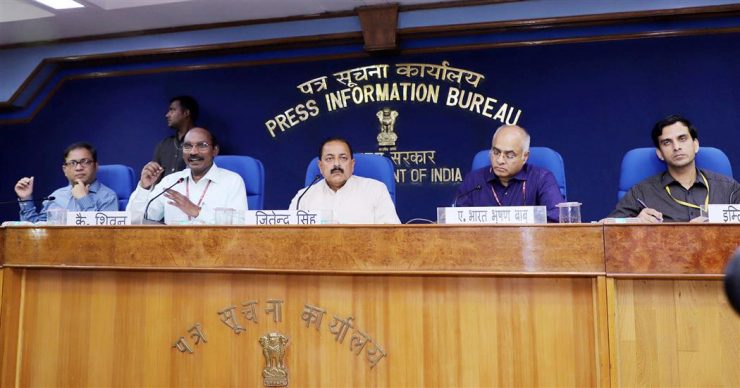
New Delhi. Union Minister of State (Independent Charge) Atomic Energy and Space Dr Jitendra Singh has lauded the commitment and hard work of scientific community and highlighted the benefits of usage of space technology in improving the lives of common people.
Dr Singh along with Chairman, Indian Space Research Organisation (ISRO) Dr K Sivan was addressing a press conference in New Delhi on June 14 on upcoming space missions of ISRO, with a specific focus on Chandrayaan 2.
He said Chandrayaan-I was instrumental in identifying water on the moon. Dr Singh said under the direction of Prime Minister Narendra Modi, applications of space technology in areas such as infrastructure, disaster management and security have eased lives of common people and improved the delivery of Government’s welfare programmes.
India has emerged as a world leader in space technology application today, he added.
On the forthcoming Gaganyaan Mission, Dr Singh said by the 75th anniversary of Independence in 2022, India would be launching its first human space flight.
He added the Government has sanctioned Rs 10,000 crores for this Mission, which is being guided by the Gaganyaan National Advisory Councilthat has eminent scientists and persons as members.
Giving a presentation on the forthcoming Missions of ISRO, Dr Sivan gave details of Chandrayaan-2, Gaganyaan, Aditya L1 and a Mission to Venus.
Dr Sivan said the objectives of Chandrayaan-2 are:
To map the variations in lunar surface composition extensively in order to trace back the origin and evolution of the moon.
Focused studies on the extent of water molecule distributionon the surface, below the surface and in the tenuous lunar exosphere to address the origin of water on moon.
The mission is planned to fly on a Geosynchronous Satellite Launch Vehicle Mark III (GSLV Mk III) with an approximate lift-off mass of 3,877 kg (8,547 lb) from Satish Dhawan Space Centre on Sriharikota Island. The launch is scheduled for 15 July 2019.
He said the controlled landing of rover on the lunar surface is the most challenging task. The mission will include eoght orbiter payloads, three Vikram Lander payloads and two Pragyaan Rover Payloads. Chandrayaan-2 represents a national effort with 500 industries and 15 institutions combining to achieve the desired objectives.
On Gaganyaan, Dr Sivan informed that ISRO has signed an MoU with Indian Air Force for selection and training of the crew. ISRO is also actively engaged in building capacity for India’s sustained human space flight programmes, with the first manned flight scheduled in or before 2022.
This will be the Gaganyaan mission, in which selected astronauts will spend three to seven days in the Lower Earth Orbit (LEO) of 120-400 km.
The ISRO Chairman spoke about the solar mission Aditya L1, scheduled for launch in 2020. This would aim to study Sun’s Corona and its impact on climatic changes.
A mission to Venus has been planned for a tentative launch in 2023, with the objective to study the atmosphere and surface topography of Venus.
Dr Sivan said ISRO is also planning to have its own Space station in the long term.
The briefing was followed by an interactive session with media.
Senior officers of Department of Space were also present on the occasion.








